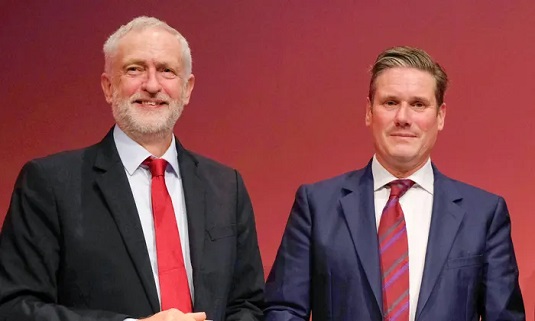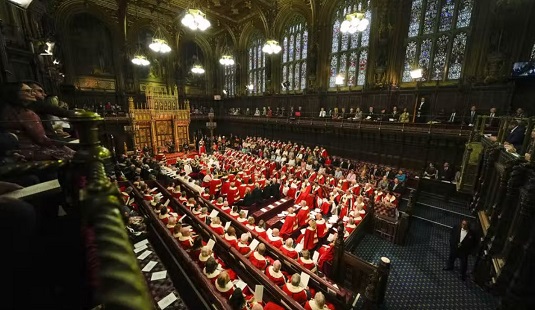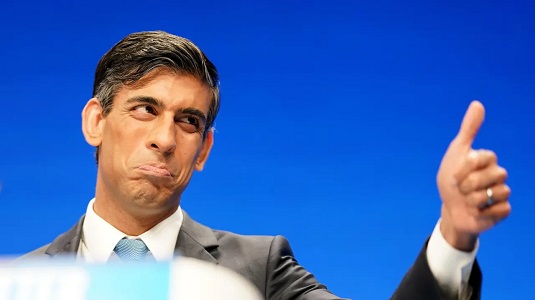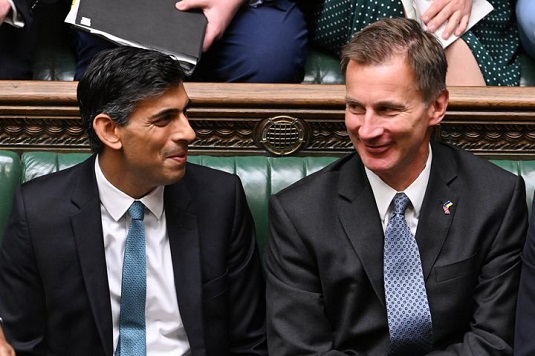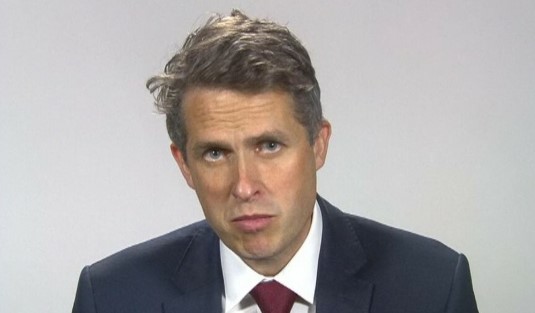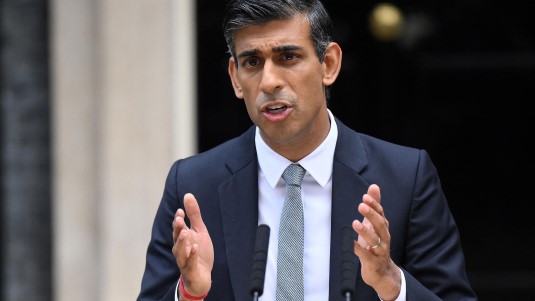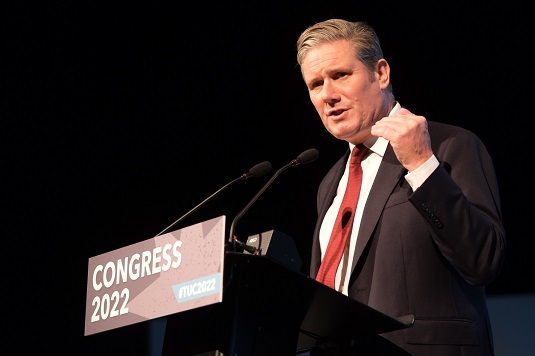
Having spent a leadership campaign making promises and then reneging on them, it's understandable that some labour movement people don't always believe what Keir Starmer says. To get around this, there's a good rule to apply. With Labour enjoying huge poll leads and it's being virtually certain of winning the next general election, what Starmer says now is what he's likely to do. There's an absence of pressure and need to compromise. When he talks about getting tough with Just Stop Oil protesters and attacks the Tories' draconian anti-immigration policies for not being efficient enough, no one has a problem believing this is what he wants to do. His authoritarian politics have been telegraphed enough times.
Yet there are a couple other things Starmer and the shadow cabinet keep going on about when they don't have to. One of them is the repurposed Green New Deal, and the other is the most significant extension of trade union rights since the 1970s. This, outlined by Andy McDonald before he quit the front bench last Autumn, got re-emphasised in Starmer's statement of intent published on the eve of the 2021 conference. Since then, Starmer has repeatedly referenced workers' rights from day one, and it got the retread treatment this weekend as Angela Rayner unveiled Labour's new deal for working people. This is not the place for a deep dive into the pledges, but more the seeming incongruity between Starmer's authoritarianism and his enthusiasm for trade unionism. Surely they are at cross purposes?
It could be read as a sop to the trade unions. Compensation for the abandonment of Corbynism's pro-worker, pro-working class agenda. And some comrades could be forgiven for thinking once the trade union reddies are banked that this charter will go the way of the Warwick I and Warwick II agreements during the Blair and Brown years. New Labour conceded worker-friendly policies in return for cash to ease the party's money woes, but were never implemented. Such scepticism is understandable and has precedent, but I don't believe either are the case. Rather, this pro-trade union position is entirely compatible with Starmer's politics. It's not a quirk or hold over from leftier times, but integral to his politics.
For one, it's been noted here enough that central to Starmer's authoritarianism is Fabian technocracy, that politics is not a question of interests or ideas, but the right managers. A position shared by most of the parliamentary party. And there are many schools of managerialism and how to handle industrial relations. Because we've got so used to neoliberal politics framing workplace matters, successive governments - even in moments of class peace - have barely concealed their treatment of workers as the enemy within. An industrial dispute is not something to be resolved, but toughed out and broken. Employees are to be starved back to work with nothing conceded. Strike action is always the result of troublesome militants. No matter how awful and bullying management is, disputes are the faults of the workers.
This does not appear to be Starmer's view. There has always been a patrician or "enlightened" management view that holds workplaces are partnerships between employer and employee, and one gets the best from workers by being friendly, supportive, relatively open, and clear about what an organisation/enterprise is trying to achieve. This is industrial relations as human resources, where the carrot always precedes the stick. Therefore, when a workforce comes into dispute it's a failure of management. They're in charge, they're responsible, and they have allowed a manageable situation to become unmanageable. Therefore, trade unionism is a means of structuring employer/employee dialogue, as well as providing basic protections against unscrupulous and unfit bosses. It's something good managers should welcome.
This might be how Starmer sees trade unionism as a workplace justice issue, but it's more politically significant than that. As mentioned here many times, in as far as a "Starmerism" exists, it's a politics for fixing the depleted state. If the state can't do basic things like sorting out passports in a timely fashion or resource enough ambulances, a crisis of legitimacy is not far away. Starmer wants to restore faith in the state and its institutions - an essential prerequisite for Fabian (and bourgeois) politics. But this also means preventing state overreach in other ways. As the Tories are set on reducing state capacity further, the Starmerist approach to trade unions have to be seen in this context. I.e. Repairing state legitimacy lies in re-establishing its "neutrality" in industrial matters. It represents the public interest versus the vested, producer interests of workers and bosses and therefore should not take sides but provide frameworks for dispute resolution. Therefore, the cowardice Labour is regularly chided over for refusing to show solidarity with workers in dispute, even when their cause is popular, is not so much a "fear" of the electoral consequences of solidarity. It has much more to do with its managerialist politics, and how Starmer wants to reposition an rebuild the state. This is in contrast to the Tory approach who go out of their way to oppose every strike and are therefore politicising disputes, making the state appear less than neutral and demonstrating its class character. Not useful for any project aimed at winning and keeping the consent of the many.
This suggest two further objectives. This empowerment of workers afforded by day one collective rights and state neutrality is suggestive of Starmerism moving in the direction of tripartism. That is abandoning the confrontational approach to industrial relations and creating partnership structures between the labour movement, business, and the state. These can only get buy in if the constituent organisations, presumably the TUC and CBI, believe government is an honest broker. Rather than the laissez-faire of the last 40-odd years, this is a way of providing purpose and giving the appearance of everyone having a stake in a common endeavour. 21st century modernisation, Starmer style, has been swotting up on the 1950s. And the second issue is by giving trade unions a position around the table, it introduces new pressures on them to discipline their members and keep demands inside the parameters of partnership. The theory being corporatist management generates industrial peace, and with it higher productivity, a prosperous economy, a happier work force, and a re-legitimised state guided by far sighted, well meaning (Labourist) managers.
I could be completely wrong, of course, but given Starmer's authoritarian politics, his concern with state modernisation, but his evident enthusiasm for extending the rights of trade unions to organise workers, this is how they fit in with his project. Evidently, this would reset the terms of class struggle in this country and raise a host of opportunities and challenges, but it's certainly a way out of the mess the Tories have left that recuperates the rising tide of trade union struggle into a politics of state legitimation and a programme for stabilising British capitalism.
Image Credit

